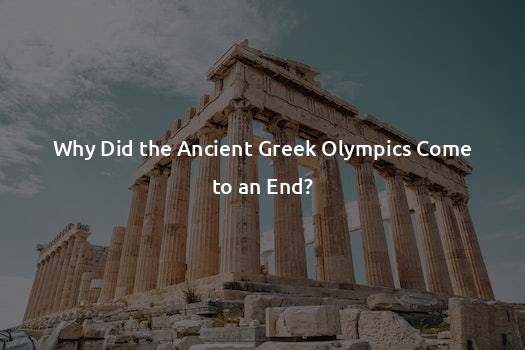Why Did the Ancient Greek Olympics Come to an End?
Why Did the Ancient Greek Olympics Come to an End?
The Ancient Greek Olympics stood as a testament to the athleticism, strength, and unity of the Greek city-states for over a thousand years. These games, celebrated every four years in Olympia, were a sacred tradition dedicated to the gods and brought together athletes from across the Greek world. However, the Ancient Greek Olympics eventually came to an end due to several factors that affected the declining interest and practicality of the games.
1. Political Instability
One of the main factors leading to the demise of the Ancient Greek Olympics was the constant political instability that plagued the Greek city-states. Throughout the 4th and 5th centuries BCE, Greece witnessed numerous conflicts, including the Peloponnesian War and the rise of Macedon under Philip II and his son Alexander the Great. These conflicts drew attention away from the games, as the priorities of the city-states shifted towards survival and warfare.
2. Decline in Religious Significance
The Ancient Greek Olympics were deeply rooted in religious beliefs, with the games dedicated to Zeus, the king of gods. As the influence of traditional Greek religion declined with the rise of other belief systems, such as Hellenistic and Roman religions, the religious significance of the Olympics also diminished. This decline in religious fervor led to a decrease in sponsorship and participation in the games.
3. Corruption and Commercialization
Over time, the Olympics became susceptible to corruption and excessive commercialization, which tainted the purity and spirit of the games. Participants were accused of bribing judges, and wealthy individuals used their influence to gain an unfair advantage. This erosion of fair play and the increasing focus on financial gain detracted from the integrity of the Olympic ideals, ultimately leading to a loss of interest and credibility.
4. Warfare and Economic Factors
The rampant warfare and economic instability faced by the Greek city-states impacted their ability to host and participate in the Ancient Greek Olympics. The wars drained the resources of the city-states, making it increasingly difficult to finance the events. Additionally, the decline in trade routes and economic downturn further hindered the financing and logistics needed to organize and sustain the games at the same scale as before.
5. Roman Conquest and Cultural Shift
The arrival of the Romans, who conquered Greece in the 2nd century BCE, brought about significant changes in the region. The Romans borrowed aspects of Greek culture, including the Olympics, but adapted them to their own values and customs. The Romans introduced lavish spectacles and gladiatorial contests, which appealed more to the tastes of the time. The popularity of these new forms of entertainment overshadowed the Ancient Greek Olympics, leading to a decline in interest and participation.
In conclusion, the Ancient Greek Olympics gradually declined and eventually came to an end due to a combination of factors. Political instability, a decline in religious significance, corruption and commercialization, warfare and economic factors, and the cultural shift brought about by Roman conquest all played a part in the demise of this grand tradition. Nevertheless, the legacy of the Ancient Greek Olympics endures, as they continue to inspire modern Olympic Games and carry forward the spirit of competition, unity, and human achievement.
TLDR; The Ancient Greek Olympics ended due to political instability, a decline in religious significance, corruption and commercialization, warfare and economic factors, and the cultural shift brought about by Roman conquest. These factors undermined the games’ integrity, financial sustainability, and overall popularity, leading to their ultimate demise. Nonetheless, the Ancient Greek Olympics remain a lasting legacy, inspiring modern Olympic Games and embodying the values of competition, unity, and human achievement.







